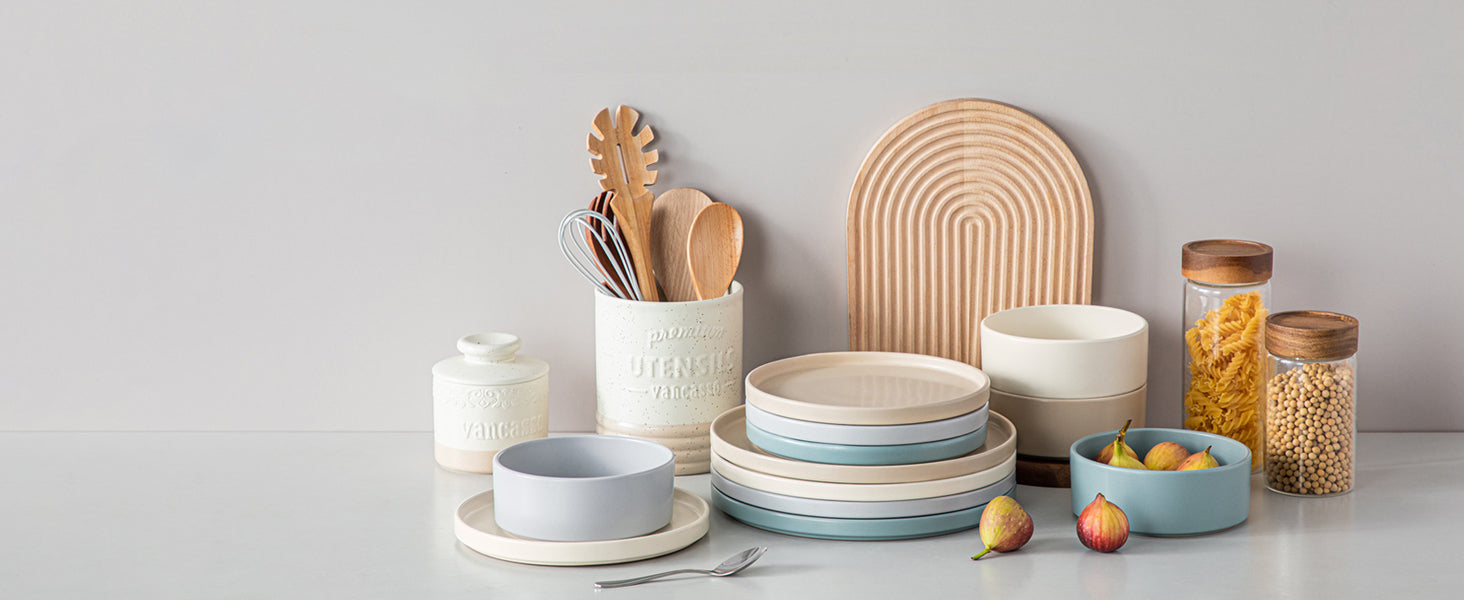Unlock the Secrets of Stoneware Dish Sets: Discover the Benefits and Essential Care Tips!
In the realm of modern kitchens, stoneware dish sets have gained immense popularity, and for good reason. These stunning pieces not only serve as functional dinnerware but also add an artistic touch to your dining table. The unique qualities of stoneware, such as its durability and heat retention, set it apart from other materials like ceramic or glass. This article aims to delve into the myriad benefits of stoneware dish sets while providing essential care tips to ensure their longevity. Whether you're a seasoned chef or just starting to explore your culinary skills, understanding the advantages of stoneware can transform your cooking and serving experience.

The Benefits of Stoneware Dish Sets
One of the standout advantages of using stoneware dish sets is their remarkable durability. Made from a high-fired clay, stoneware is designed to withstand the rigors of daily use, making it perfect for families or individuals who frequently entertain guests. Unlike porcelain or glass, which can chip or break easily, stoneware is resistant to chipping and scratching. This resilience means you can enjoy your favorite dishes without constantly worrying about damaging your dinnerware.
In addition to durability, stoneware excels in heat retention. When you cook with stoneware, it distributes heat evenly, ensuring that your food is cooked to perfection. This characteristic is particularly beneficial when baking, as it helps achieve that coveted golden-brown crust on your favorite dishes. Furthermore, stoneware can be used for both cooking and serving, allowing for a seamless transition from oven to table without the need for additional serving dishes.
Aesthetically, stoneware comes in a variety of colors and finishes, making it easy to find a set that complements your kitchen decor. Many people find that stoneware dishes enhance the presentation of their meals, adding a rustic charm that is perfect for casual gatherings or formal dinners alike. Friends of mine who recently switched to stoneware have shared that their meals look more appealing, encouraging their family to gather around the table more often.
Understanding the Composition of Stoneware
Stoneware is made from a specific type of clay that is fired at high temperatures, typically between 2,190°F and 2,350°F. This firing process not only strengthens the material but also creates a non-porous surface, which means it won’t absorb food odors or stains. Unlike earthenware, which is porous and requires glazing to be functional, stoneware's composition allows it to be naturally non-porous, making it a healthier option for food storage and preparation.
The firing process also gives stoneware its characteristic weight and sturdiness. When compared to other types of pottery, such as porcelain, stoneware is generally thicker and more robust. This thickness provides insulation, keeping your food warm longer. Understanding the composition of stoneware can help you appreciate the craftsmanship behind each piece, reinforcing why it is a worthwhile investment for your kitchen.
Essential Care Tips for Stoneware Dish Sets
To ensure your stoneware dish sets remain in excellent condition, proper care is essential. Start with cleaning—avoid using abrasive cleaners or scouring pads, as these can scratch the surface. Instead, opt for gentle dish soap and a soft sponge. If you encounter stubborn stains, a paste made from baking soda and water can work wonders without damaging the finish.
Temperature shock is another critical factor to consider. Stoneware can withstand high temperatures, but sudden changes can lead to cracking. To prevent this, always allow your stoneware to come to room temperature before placing it in a hot oven or vice versa. Additionally, when storing your stoneware, avoid stacking them directly on top of each other without protective padding, as this can lead to scratches or cracks over time.
Many people recommend seasoning your stoneware before its first use. This process involves applying a thin layer of vegetable oil to the surface and baking it at a low temperature for about an hour. This helps create a natural non-stick surface and enhances the longevity of your dish set. Friends who have followed this advice often rave about how easy it is to clean their stoneware after cooking.
Common Myths about Stoneware Care
Despite its many benefits, there are numerous misconceptions about stoneware care that can deter potential users. A common myth is that stoneware cannot be used in microwaves or dishwashers. In reality, most stoneware is microwave-safe and dishwasher-friendly, as long as it is labeled as such. This makes it a practical choice for modern kitchens where convenience is key.
Another myth is the belief that stoneware cannot withstand high temperatures. This is untrue; stoneware is designed to be oven-safe, but it’s essential to follow the manufacturer's guidelines regarding temperature limits. By addressing these myths, we can help more people appreciate the versatility and convenience of stoneware dish sets in their daily lives.
Final Thoughts on Stoneware Dish Sets
In summary, stoneware dish sets offer a blend of durability, aesthetic appeal, and practical benefits that make them a fantastic choice for any kitchen. By understanding their unique composition and following essential care tips, you can ensure that your stoneware remains a staple in your home for years to come. Whether you're hosting a dinner party or enjoying a quiet meal at home, stoneware adds a touch of class and functionality to your dining experience. We encourage you to consider stoneware as a sustainable and stylish addition to your kitchen and invite you to share your own experiences or questions about stoneware dish sets.








